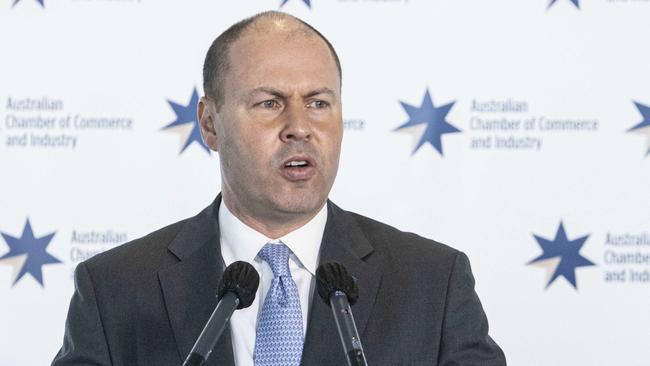Coronavirus: Nation’s debt skyrockets as economy sinks further into red
Australia’s pandemic-induced debt and deficit spiral has been fuelled by a $33.1bn slide in tax receipts and record government spending on COVID-19 payments.

Australia’s pandemic-induced debt and deficit spiral has been fuelled by a $33.1bn slide in cash receipts and record government spending on COVID-19 payments, pushing the nation’s net debt to almost $500bn by the end of June.
The final 2019-20 budget outcome released by Josh Frydenberg on Friday showed a further deterioration of the nation’s finances as coronavirus restrictions and border closures triggered a free-fall in tax receipts and a spike in payments supporting $300bn in economic measures. The Treasurer said the combined effect of a $57.7bn increase in cash payments and a $31.8bn shortfall in tax receipts, excise and duties had delivered an $85.3bn deficit and wiped out the projected $5bn surplus forecast in December’s mid-year update.
Mr Frydenberg, who this week confirmed the government would prioritise jobs growth over budget repair until unemployment fell below 6 per cent, said the October 6 budget would focus on getting Australians back to work.
“Fiscal policy is the main game in town,” he said. “We don’t have the luxury that governments and banks had in previous crises by being able to reduce monetary policy, or reducing the cash rate substantially, by using monetary policy to provide stimulus across the economy.”
The final budget outcome showed net debt to June 30 rising to $491.2bn, $3bn higher than estimated in the economic and fiscal update released on July 23. Gross debt increased to $684.3bn, or 34.5 per cent of GDP in 2019-20.
With international borders and global supply chains hit hard by the pandemic, Australian Bureau of Statistics trade data released on Friday showed imports fell $1.785bn, or 7 per cent, in August with exports falling $616m to $28.3bn.
Finance Minister Mathias Cormann said the final budget outcome reflected the economic and fiscal impact of the pandemic.
“We are here because of the cost of the fiscal support we necessarily had to provide to our health system, to the economy, to businesses, to working Australians and to those Australians who lost their job through no fault of their own as a result of this pandemic,” Senator Cormann said. The government’s economic strategy was aimed at the “strongest possible economic and jobs recovery which will also help repair the budget”.
“The budget … will provide the next instalment of our plan to help ensure that happens. Australia remains in a better, stronger, more resilient position than just about any other country in the world,” he said.
Opposition treasury spokesman Jim Chalmers said while Labor acknowledged the COVID-19 crisis was affecting the budget and economy “debt was already at record highs”.
“This government has the highest debt ever; they’ve got high unemployment, and they still don’t have a proper jobs plan to turn things around,” Mr Chalmers said.
“The Treasurer talks about jobs and boosting demand but he is already withdrawing critical support from the economy during the worst recession in almost a century.”
Net Future Fund earnings, currently excluded from the underlying cash balance, came in $400m lower than mid-year update projections at $5bn. From 2020-21, Future Fund cash earnings will be included in such calculations to help meet the government’s superannuation liabilities.
Iron ore continues to prop-up the export market, with ABS international statistics program manager Branko Vitas on Friday confirming the strength of the resources trade had offset monthly falls in gas, textiles and power-generating machinery products.
The ABS data showed exports to China, Japan, South Korea and India had risen, with drops recorded in trade to the US and Britain.
Subscribers can sign-up to receive budget newsletters at theaustralian.com.au/newsletters



